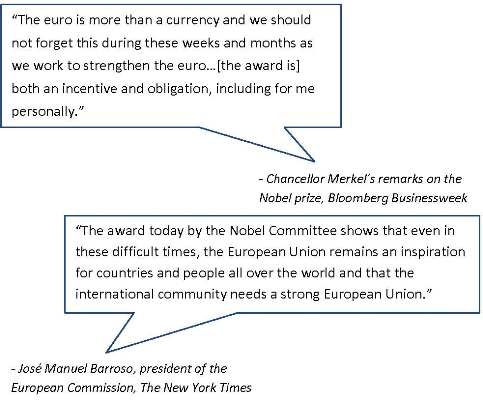The Nobel’s New Narrative

Alexander Privitera
AGI Non-Resident Senior Fellow
Alexander Privitera a Geoeconomics Non-Resident Senior Fellow at AGI. He is a columnist at BRINK news and professor at Marconi University. He was previously Senior Policy Advisor at the European Banking Federation and was the head of European affairs at Commerzbank AG. He focuses primarily on Germany’s European policies and their impact on relations between the United States and Europe. Previously, Mr. Privitera was the Washington-based correspondent for the leading German news channel, N24. As a journalist, over the past two decades he has been posted to Berlin, Bonn, Brussels, and Rome. Mr. Privitera was born in Rome, Italy, and holds a degree in Political Science (International Relations and Economics) from La Sapienza University in Rome.
With the recent awarding of the Nobel Peace Prize to the European Union, AGI takes a look at what some of Europe’s leaders are saying about the meaning of the award at this time, as well as what the award could mean for Europe as its struggles to right its financial ship.
From Senior Fellow Alex Privitera:
“The EU is currently undergoing grave economic difficulties and considerable social unrest. The Norwegian Nobel Committee wishes to focus on what it sees as the most important result: the successful struggle for peace and reconciliation and democracy and human rights. The stabilizing part played by the EU has helped to transform most of Europe from a continent of war to a continent of peace.” This is how Thorbjorn Jagland, the head of the Norwegian Nobel Committee explained the choice to award the European Union with the Nobel Peace Prize. Some commentators were quick to point out similarities with the decision in 2009 to grant then newly elected U.S. President Barack Obama with the prize. But there are major differences: Obama’s award was based on hope, the hope that he would restore America’s battered image in the world. Today’s decision has more to do with fear. The Nobel Prize Committee decided to remind Europe of its recent achievements and tell its leaders that they should not jeopardize the goal of a closer union. It is a troublesome sign when even the Nobel Prize Committee has to warn European politicians and their citizens not to lose their common compass.








